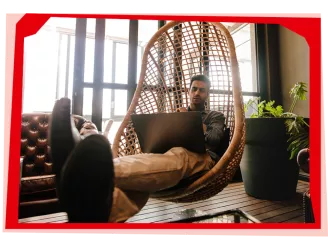The Future of Work: Flexible Working
Changing the way people work
For Millennials, finding the right place to work is only part of their ambition. Not only are they looking for the right environment, but they are also looking for somewhere to develop their skills. But, as technology changes the way people work, it also changes the skill set people need in the workplace.

Continuous growth
A study by the McKinsey Global Institute predicted that, by 2025, automation could jeopardise between 40m and 75m jobs worldwide. Some jobs will disappear and others will grow. And technology will create new jobs that don’t even exist today.
According to the survey carried out by the World Economic Forum’s Global Agenda Council on the Future of Software and Society, negotiation and flexibility were high on the list of skills for 2018. As we move towards the future, those skills will begin to drop in importance as machines, using masses of data, begin to make our decisions for us. Similarly, active listening, will disappear completely from the top 10. Whereas active learning is set to become a skill that everyone will need in the future.
Creativity needed
Creativity will become one of the top three skills workers will need to develop. With the vast amount of new products, new technologies and new ways of working in the future, workers will need to become more creative in order to benefit from the changes. Robots may help people get to where they want to be faster, but they can’t be as creative as humans (yet). Unfortunately, most schools and colleges of today do their best to standardise creativity. So how is the workforce of the future supposed to follow their passion without any institutional or cultural encouragement, career support or mentoring?
Technology is already impacting the way we work and the future workplace. Artificial intelligence, 3D printing and advanced materials are still in their early stages of use, but the pace of change will be fast. Business leaders, educators and governments all need to be proactive in up-skilling and retraining people so everyone can benefit from the Fourth Industrial Revolution (Davos, 2018).

Everyone has a voice with technologies
Our participants told us that technology helps them to learn more effectively. It simplifies the learning process and assists creativity. They feel that technology helps them to share and improve their knowledge and makes them feel more connected to people and the wider world. Millennials use technology for fast access to information, entertainment, communication, learning and improving their skills. They also believe that technology has a positive impact on society and could be a tool for promoting diversity and inclusion. They say that “With technologies everyone has a voice”. At the same time, they also see there could be a downside of a lack of face-to-face communication and personal interaction.
During the workshop it became clear that this generation craves the chance to contribute creatively to the workforce and have their ideas heard. They feel this will help them grow professionally in any given post. And, since personal development is important for these workers, they’ll be more likely to stick around longer.
Workplace diversity
Millennials care about the diversity in the workplace: the forms of differences in age, culture, gender, language and physical health. The future workplace should allow individuals who may have special needs to modify their workspace as necessary with minimal administrative hassle and maximum discretion, thus advancing inclusiveness organically.
There is also a need for workplaces to prepare for a cross-generational environment. As younger members of the workforce come on-board and the older generation continues to work past their retirement age, there will be a need for these differing generations to collaborate. These shifting demographics mean diverse teams are essential to staying afloat, and that managers and leaders will need to be inclusive and sensitive to everyone in the smart office of the future.

Get in touch
If you have any questions, or would like to find out how Sharp can help your business be a successful workplace of the future, then get in touch.
